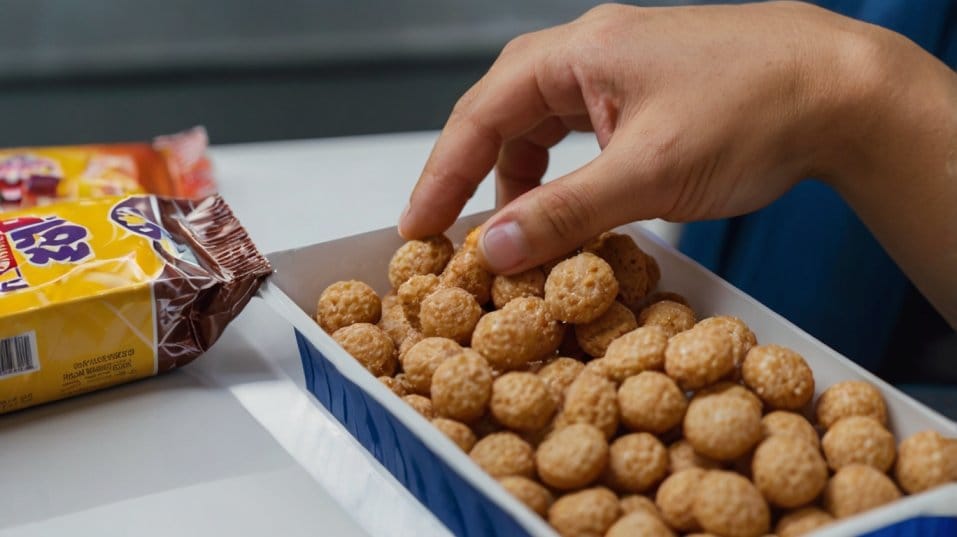How Sugar Affects Focus and How Mindfulness Can Reduce Cravings
Sugar spikes drain focus and fuel cravings. Mindfulness helps break the cycle, improving self-control and mental clarity. Here’s how to start.

Ever feel like your brain is working against you in the afternoon? That sluggish, unfocused state might not be from overwork—it could be a sugar crash.
When blood sugar spikes and drops, concentration fades, cravings take over, and energy nosedives. The cycle feels automatic, but it isn’t inevitable.
Mindfulness can help you recognize triggers, break free from sugar-driven habits, and make choices that keep your focus steady throughout the day. Ready to take back control?
The Science of Sugar and Focus
Your brain needs glucose to function, but too much sugar sends it into chaos. Refined sugars cause rapid blood sugar spikes, triggering insulin surges that lead to energy crashes. The result? Irritability, fatigue, and brain fog.
Excess sugar also disrupts neurotransmitters. The dopamine rush makes sugar addictive, while chronic consumption causes inflammation in the brain, impairing cognitive function and memory.
Over time, this leads to sluggish thinking, difficulty concentrating, and a constant need for another hit of sugar-fueled energy.
High sugar consumption has been linked to impaired neuroplasticity—the brain's ability to adapt and form new connections. This makes it harder to learn, retain information, and stay mentally sharp.
Over time, sugar-fueled inflammation can increase the risk of neurodegenerative diseases like Alzheimer’s, which some researchers now refer to as "Type 3 diabetes" due to its link with insulin resistance in the brain.
Sugar also affects the gut microbiome, which plays a critical role in cognitive function. A diet high in sugar reduces beneficial gut bacteria, leading to increased inflammation and disruptions in mood and concentration.
The gut-brain connection means that what you eat directly impacts how well you think and focus.

The Craving Loop: Why Sugar Feels Irresistible
Sugar hijacks your brain’s reward system. Every sweet bite releases dopamine, reinforcing the habit. Stress, exhaustion, and boredom amplify cravings, making sugar an easy go-to.
The more frequently you indulge, the stronger the cycle becomes—until reaching for sugar feels automatic. Your body learns to anticipate sugar at certain times of the day, making cravings feel inevitable.
That 3 PM energy dip? It’s partly physiological, but if you consistently reach for sugar at that time, your brain strengthens the habit loop. Breaking free requires awareness and an intentional shift in responses.
Cravings are also influenced by hormones. Ghrelin, the hunger hormone, increases sugar cravings, while leptin, which signals fullness, is disrupted by excessive sugar intake.
This imbalance makes it harder to recognize when you’re actually hungry or just responding to a craving trigger.
Mindfulness as a Sugar Craving Disruptor
Mindfulness interrupts autopilot responses, giving you the space to choose rather than react. Instead of mindlessly reaching for sweets, you can develop awareness, pause, and make intentional decisions.
- Recognizing Triggers: Noticing when cravings hit—whether from stress, fatigue, or habit—helps break the cycle.
- Observing Without Judgment: Rather than labeling cravings as bad, acknowledge them without immediate reaction.
- Tuning Into Sensations: A few deep breaths or a quick body scan can create space between craving and action.
- Mindful Eating: Slowing down and savoring each bite enhances satisfaction, reducing the need for excess sugar.
Mindfulness also reduces emotional eating. Many cravings stem from emotions rather than actual hunger. Stress, frustration, or even celebration can trigger an urge for sugar.
By recognizing emotional triggers, you gain the ability to pause and consider whether food is truly what you need in that moment.
Additionally, practicing mindful movement—such as yoga or walking—can help regulate cravings by reducing stress and increasing body awareness. These activities support blood sugar balance and reinforce healthier habits.
Training Your Brain for Better Focus
Mindfulness strengthens the prefrontal cortex—the brain’s control center—enhancing decision-making and impulse control.
Studies show mindfulness can lower cortisol levels, reducing stress-driven sugar consumption. With practice, cravings lose their grip, and focus becomes more consistent.
Regular mindfulness practice also improves cognitive flexibility—the ability to shift between tasks and think creatively.
This means fewer moments of feeling stuck, overwhelmed, or mentally drained. Instead of reacting to distractions, you become more present, making it easier to stay engaged and productive.
Beyond reducing sugar, mindfulness supports overall brain function.
Mindfulness meditation has been shown to increase gray matter density in areas associated with memory, emotional regulation, and learning. This makes it an essential tool for long-term cognitive health.
Applying Mindfulness to Sugar Cravings
Mindfulness isn’t just about recognizing cravings—it’s about responding to them in a way that aligns with your goals.
By applying simple yet effective mindfulness techniques, you can interrupt automatic habits and make more intentional choices when sugar cravings strike.
- Pause Before You Eat: When a craving strikes, take a few moments to check in. Are you hungry, stressed, or just on autopilot?
- Engage Your Senses: If you indulge, slow down. Notice the taste, texture, and how your body responds.
- Use Meditation for Cravings: A short daily breath-awareness practice builds self-control and reduces emotional eating.
- Rewire the Habit Loop: Instead of mindlessly reaching for sugar, opt for a healthier alternative while staying present with your choices.
- Shift Your Environment: Keep sugary snacks out of immediate reach and replace them with nutritious options that provide stable energy.
- Identify Your Why: A clear reason for reducing sugar—better focus, improved energy, or long-term health—reinforces motivation.
- Incorporate Protein and Healthy Fats: These macronutrients help stabilize blood sugar and keep cravings in check, making mindful choices easier.
- Stay Hydrated: Dehydration can sometimes be mistaken for sugar cravings. Drinking water before reaching for sugar can help clarify real hunger cues.
Final Thoughts
Sugar can sabotage focus and productivity, but you don’t have to be at its mercy. Mindfulness helps you regain control, making cravings less overpowering and decisions more intentional.
Start now—next time a craving hits, take a deep breath, pause, and see what happens. Change begins with awareness, and the power to shift your habits is already within you. Small, mindful choices add up to lasting transformation.
By developing a deeper connection between what you eat and how you feel, you cultivate long-term habits that support mental clarity, stable energy, and overall well-being.
With mindfulness, breaking free from the sugar cycle isn’t about deprivation—it’s about empowerment.




